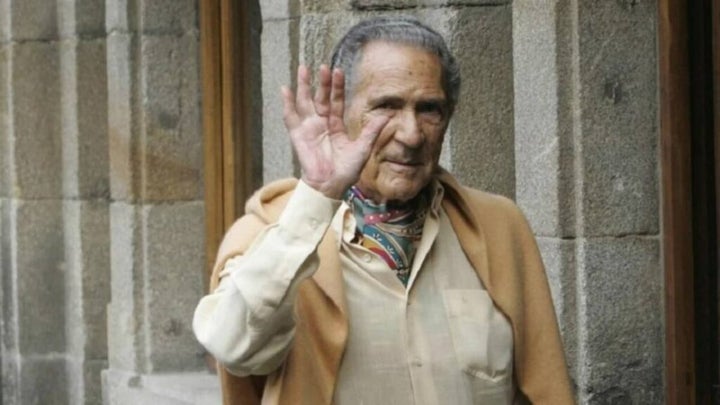News
Remembering Antonio Gala: Spain Bids Farewell to an Iconic and Provocative Writer
The writer, adopted from Córdoba, bids farewell at the age of 92, leaving behind an immeasurable cultural legacy.

- May 29, 2023
- Updated: March 7, 2024 at 9:45 PM

Today, Sunday, May 28th, the world of Spanish literature mourns the loss of one of its great figures: Antonio Gala. Canal Sur has announced that the acclaimed writer, poet, and playwright has passed away at the age of 92 in Córdoba, after being unable to overcome several health conditions.
As later confirmed by close sources to the family, Gala bid his final farewell from the headquarters of his cultural foundation, located in the former convent of Corpus Christi.
One of the best voices of our time
To talk about Antonio Gala is to discuss one of the greatest voices of our time. Born in Brazatortas (Ciudad Real), the writer always considered himself an adopted Cordoban since his family moved to the Andalusian city when he was only 9 years old. It was precisely there that a young Antonio Gala began writing his first works and stood out among literary circles, to the extent that at the age of 14, he gave a lecture at the Real Círculo de la Amistad, Liceo Artístico y Literario de Córdoba.
From that moment, the career of the Andalusian writer skyrocketed. At the age of 15, he began studying Law at the University of Seville, where he successfully completed his degree. In an act of rebellion, as he has said countless times, he refused to continue preparing for the State Lawyers Corps exams and was also expelled from the Carthusian Order for not conforming to monastic life.
Gala’s true identity as a writer emerged from this point onward, as he juggled his passion with teaching philosophy and art history in schools to make a living. In 1959, he published his first poetry book, Enemigo íntimo, which won him the Adonais Poetry Prize for his verses. It took 22 years to see his poems again with 11 sonnets in La Zubia (1981), leading up to his most recent publication in 2019, Desde el Sur te lo digo.
In the world of theater, the adopted Cordoban embarked on his journey with Los verdes campos del Edén (1963), which won him the National Theater Calderón de la Barca Award. Throughout his life, he wrote over twenty plays, some of which were highly popular and successful, such as Anillos para una dama (1973), ¿Por qué corres, Ulises? (1975), Petra regalada (1980), Samarkanda (1985), Carmen, Carmen (1988), and La Truhana (1992).
With such an extensive career, Gala did not try his luck in the world of narrative until the 1990s. However, he once again made a grand entrance: El manuscrito carmesí (1990) won the prestigious Planeta Prize. All of his early works in theater, poetry, and narrative received awards. Furthermore, the rest of the writer’s books have become part of popular culture, such as La pasión turca (1993), Más allá del jardín (1995), Ahora hablaré de mí (2000), El pedestal de las estatuas (2007), and Los papeles del agua (2008).

A vindictive figure
Antonio Gala stood out throughout his life as a highly vocal and socially conscious figure. Even during the tumultuous period of the Spanish transition, he defended left-wing political parties. Furthermore, he always identified himself as a true Andalusian, which led him to support Andalusia’s autonomy in the Congress of Andalusian Culture in Córdoba in 1978.
Gala was also part of the platform that supported the “No” vote for Spain’s entry into NATO and he criticized the Israeli regime’s actions against the Palestinian people on numerous occasions. Through his newspaper columns, he commented on current events and didn’t hesitate to criticize various institutions.
As an interesting fact, Antonio Gala also wrote television scripts in three different decades. He obtained degrees in Philosophy and Literature, Political Science, and Economics from the University of Madrid, all of which were earned as an independent student. Following a life-threatening duodenal perforation in 1973, Gala began using a cane. This became a defining characteristic of him, with over 3,000 canes collected in his residence.
May you rest in peace, Antonio.
Journalist specialized in videogames and technology. Almost two decades dedicated to it.
Latest from Nacho Requena Molina
You may also like

Electric Supercar Achieves 1,000 Horsepower and Double Downforce in Historic Test
Read more

What you can do with the Gemini extension for Google Photos and why you should try it now
Read more

How to reliably check your internet speed
Read more

Stellantis Expands EV Lineup Amid Tariff Challenges
Read more

Can quantum computers eradicate fraud? UK thinks so
Read more

Should you buy from the Apple refurbished store?
Read more